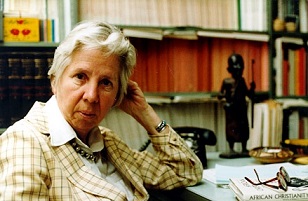
Elizabeth Florence Colson
Professor of Anthropology, Emerita
Elizabeth Florence Colson was an eminent sociocultural anthropologist, trained and working in both the American and British traditions. Among all anthropologists, regardless of sub-discipline or national origin, her name was associated with impeccable, innovative scholarship on a wide variety of subjects, especially North American and African ethnography, as well as migration, forced resettlement, economic development, and refugee studies.
Colson was born in Hewitt, Minnesota, on June 15, 1917, and died in Zambia, Africa, on August 3, 2016, just short of her 100th birthday. Her higher education began at the University of Minnesota, where she received her B.A. in anthropology in 1938. She originally planned to concentrate on archaeology. However, in graduate school at Radcliffe College (Harvard University), where she studied under Clyde Kluckhohn, she decided to focus on social anthropology. While at Harvard, she attended a field school collecting sociocultural data among the Pomo Indians of California. This project resulted in the production of an M.A. thesis on Pomo acculturation in 1941. Her Ph.D. dissertation followed the same theoretical path: a study of acculturation among the Makah Indians of the Olympic Peninsula in the state of Washington. Throughout her lifetime, Colson maintained an abiding interest in native North American ethnography, and occasionally taught on this topic, despite changing geographic emphases. She received the Ph.D. in 1945.
In a career that spanned more than seven decades, Colson taught at a wide variety of institutions, including Boston University, Goucher College, and Brandeis University. Her teaching career ended at the University of California, Berkeley, where she joined the Department of Anthropology in 1964 and remained until 1984, when she retired and became emerita. Until the end of her life Colson spent her time writing, carrying out fieldwork, attending conferences, and remaining highly productive in scholarly pursuits. (She was also an avid fan and voracious reader of detective novels.) In addition to teaching at Berkeley, she assumed several important administrative roles, including membership on the systemwide Academic Senate’s Editorial Committee (1974-77, 2004-05) and as chair of the Berkeley Division’s Committee on Budget and Interdepartmental Relations (1971-72).
However, perhaps her most formative and formidable administrative position began right after receiving her doctoral degree, from 1947 and until 1951, when she served as director of the Rhodes-Livingston Institute in Zambia. There she acquired a deep and lasting interest in the peoples of Central Africa, particularly the Plateau Tonga and the Gwembe Tonga, both of which provided the basis for some of Elizabeth Colson’s most important and influential publications.
Colson’s work included extensive research on social problems deriving from political and economic disruption. During World War II, Colson contributed periodically to Alexander Leighton’s project on Japanese relocation camps, sites of Japanese American imprisonment. Colson focused specifically on the Poston War Relocation Camp (Arizona). Looking back on this experience, she wrote, “I can only say that we regarded internment as a gross violation of civil rights. But I thought then as I think now that witnesses were needed and that anthropologists had skills suited to that task.” This experience possibly piqued her longtime scholarly concern with forced resettlement. Together with anthropologist Thayer Scudder, she carried out research and published extensively on the compulsory relocation of the Tonga people, who were displaced from the Zambezi River Valley as a result of construction of the Kariba Dam in Zambia.
Her continued engagement with the displaced Tonga through longitudinal studies (a notable publication covered the period 1956-1991) and her collaborative research, first with the Rhodes-Livingston team, then with Thayer Scudder and others (including a remarkable 1987 study of “temporal heterogeneity in African land use” with Scudder, Jane Guyer, Pauline Peters, Paul Richards and others) shaped her lasting conceptual legacy in the fields of anthropology and of African studies. On the one hand, she made important contributions to “anthropological involvement with time” (the subtitle of a signal 1984 publication, The Reordering of Experience, from the perspective of an aging anthropologist engaging with informants moving through their own lifecycles over the course of her continued return visits, as well of a changing field site). On the other hand, she was a generous collaborator in research and publication with both peers and students. She mentored younger anthropologists working in Zambia and freely gave access to her notes and papers to those interested in gaining an historical perspective on their field sites.
During her long career, Elizabeth Colson received a host of honors. In 1973 she delivered the prestigious Lewis Henry Morgan Lectures at the University of Rochester in New York, which resulted in the publication of Tradition and Contract: the Problem of Order (1974), a study of social forces promoting stability and change in traditional societies. In 1975, Colson was invited to deliver the Distinguished Lecture at the Annual Meeting of the American Anthropological Association, and in 1977 she was elected to the American National Academy of Sciences. Aside from these high honors, she was awarded an honorary doctor of science from Rochester University. She was selected as a Berkeley Faculty Research Lecturer in 1983, then received the Berkeley Citation, one of Berkeley’s highest honors, in 1985. From 1996 to the present, the Refugee Studies Center at the University of Oxford has hosted annually the Elizabeth Colson Lecture.
Colson is survived by a nephew, Robert H. Colson of White Plains, N.Y. Additional obituaries and archival materials can be found at: https://www.therai.org.uk/archives-and-manuscripts/obituaries/elizabeth-colson and https://savageminds.org/2016/08/10/vale-elizabeth-colson/.
Margaret W. Conkey
Stanley Brandes
Mariane Ferme
2019
